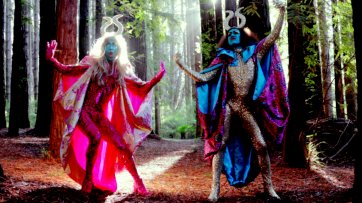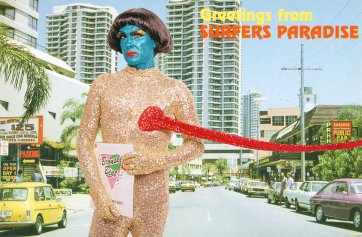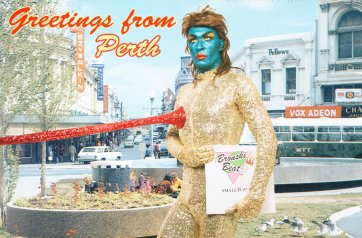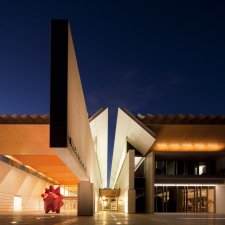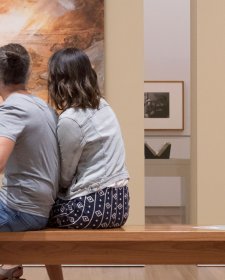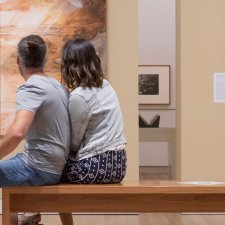- It was so successful, we just got asked to do lots of things together and we didn't even call ourselves The Huxleys. People would say, "Oh, the Huxleys are here. Who are these, Huxleys?" So everything just happened. It wasn't really planned.
- When we started making art, no art places took us seriously. We tried to show in galleries to represent us and tried to get the art community behind us and no one was interested. And we were just like, "We love doing this enough that we're just going to put it out into the world." And we kept making things on our own, funding our own projects, doing it because we loved it. And eventually people catch up with you and you know, a lot of people ask us, "Do you make your own things?" And we're like, "Where else would we find these?" And I think by the fact that you're not trained, or neither of us are trained is a good thing because it allows you to dream bigger. Otherwise you might say, "That can't be created."
- You're not confined by any rules and you make things that other people will be like, "Oh, you can't do that." And you just find a way, so you just do it. And I've had fashion designers look at my work and go, "How did you do this," or, "How do you get into it?" And I'm like, "Oh, this way and that way." But you just don't have any rules in your head.
- Garrett and I decided to make a series of work called "Postcards from the Edge." And these are postcards from the areas and the places that we grew up in. So Garrett is from the Gold Coast and I am from Perth. And we went on this journey where we tried to find and source postcards from the area and the places that exactly places that we were in as children.
- Yeah, and by taking yourself back to that time as you are now, I felt the same as, you know, when I was 12 in that situation even though I wasn't you know, painted in green, glitter, and had wigs. I felt like that. And I completely felt like that so it was nice, you know, bringing those two worlds together.
- And one thing that we did that was nice with the postcards is this two postcards called "Small Town Boy: Perth" and "Small Town Boy: Gold Coast." Where we actually meet and we're joined by a sequin string of heart between us. And it was our idea that wouldn't it been wonderful if we had actually met from those places. And it's a way of us coming together. We did a thing together maybe five years ago, it was called "People of Letters." We wrote letters from the time when we were struggling, growing up in these places to each other, like dreaming of each other. And it was so beautiful because it was just like the idea that you could have someone that would make you feel okay for who you were at that time. Like, if I had met Garrett when I was in school, I think my life would've been a lot easier. And that was something that, yeah.
- And it's been nice since we've met each other and being together, we go back to Perth and the Gold Coast. And in a place that you used to get yelled at for being gay, being called poof, or whatever. You know, people are like, "I like your outfit." And I'm like, "Okay, this is nice." You know, things are changing which is really beautiful.
- The idea of masking is fascinating to me because it creates this almost anonymous, we could be anyone or anything underneath that mask. And it gives this sense of freedom. For me I love the idea that it takes away, you know, wearing costumes that hide your identity. It takes away gender and it takes away race and class and all these things that were divided and put into binaries. And once you become this creation, it's so freeing and I couldn't get up and perform as well, obviously, it would be terrifying. But when I'm at an amazing costume and makeup and wigs, it creates this diversion that allows me to be the most fantastical escapist version of myself possible. It gives me the confidence.
- Yeah, I think wearing the mask came from not wanting to be seen first, so hiding behind the mask. 'Cause I grew up very shy and still am quite shy and introverted. And I find it more interesting to look at as well. I find something like that more interesting. But you develop something in you, you find a power or something that isn't you. It's a freedom, you escape from all these constraints on yourself. So there is something really liberating about performing not as yourself, but as these characters that you've created in a way, but it's still you, you know.
- In costume, generally it always interested me. Even like, people, military, or any kind of costume, you're putting on something to go out in the world and do a role and do something that you maybe not when you're at home.
- Well, what's interesting, when we make our costumes, we don't know who's going to pop out in a way. And it's just so interesting, like you think, "Oh my God, I can't believe I'm this frantic character inside this costume. Didn't expect this." And yeah, the latest ones we know something's going to happen. We put the latest costumes on and we're like, "Oh, this is slow." You know, there's a slow kind of graceful people that are happening at the moment. It's really exciting.
- We call it from page to stage. We love the drawings that we do when we come up with an idea. So basically, I mean neither us are very good drawers. I'm particularly bad, but they're like childlike drawings of either like a photographic scene or a costume. And it's amazing when you take that childlike drawing and then bring it into a reality. I love that transformation. And the costumes often end up looking like me.
- They look like, the pictures.
- The pictures, but like a heightened glamorous version. I love seeing the contrast between those two things and they're your dream and then the reality made. Yeah, I think that is one of the great thrills for me seeing it when it comes to life. Yeah.
- And in between that there's a lot of frustration, tears. And, "This isn't going to work."
- Yeah, there's a lot. There's a lot of failures, trial and error, you know.
